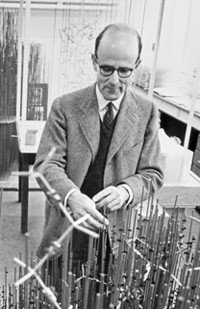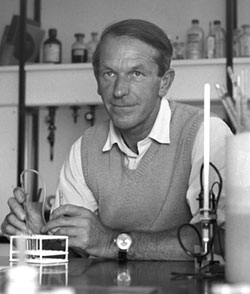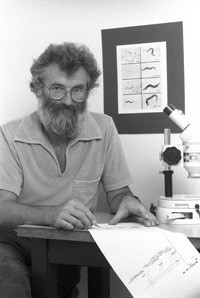 Max Perutz
Max Perutz
from the Preface to "I Wish I’d Made You Angry Earlier"
“Every now and then I receive visits from earnest men and women armed with questionnaires and tape recorders who want to find out what made the Laboratory of Molecular Biology in Cambridge (where I work) so remarkably creative. They come from the social sciences and seek their Holy Grail in interdisciplinary organization. I feel tempted to draw their attention to 15th-century Florence with a population of less than 50,000, from which emerged Leonardo, Michelangelo, Raphael, Ghiberti, Brunelleschi, Alberti, and other great artists. Had my questioners investigated whether the rulers of Florence had created an interdisciplinary organization of painters, sculptors, architects, and poets to bring to life this flowering of great art? Or had they found out how the 19th-century municipality of Paris had planned Impressionism, so as to produce Renoir, Cézanne, Degas, Monet, Manet, Toulouse-Lautrec, and Seurat? My questions are not as absurd as they seem, because creativity in science, as in the arts, cannot be organized. It arises spontaneously from individual talent. Well-run laboratories can foster it, but hierarchical organization, inflexible, bureaucratic rules, and mounds of futile paperwork can kill it. Discoveries cannot be planned; they pop up, like Puck, in unexpected corners.”
 Fred Sanger
Fred Sanger
from "Annual Review of Biochemistry" (1988)
“I have indeed actively tried to avoid both teaching and administrative work. This was partly because I thought I would be no good at them, but also out of selfishness. I do not enjoy them, whereas I find research most enjoyable and rewarding. Of the three main activities involved in scientific research, thinking, talking and doing, I much prefer the last and am probably best at it. I am all right at thinking, but not much good at the talking. ‘Doing’ for a scientist implies doing experiments, and I managed to work in the laboratory as my main occupation from when I started as a Ph.D. student until I retired. Unlike most of my scientific colleagues, I was not academically brilliant. … However, when it came to research where experiments were of paramount importance and fairly narrow specialization was helpful, I managed to hold my own ...”
François Jacob
in "Of Flies, Mice and Men"
“Day science calls into play arguments that mesh like gears, results that have the force of certainty…. Conscious of its progress, proud of its past, sure of its future, day science advances in light and glory. By contrast, night science wanders blind. It hesitates, stumbles, recoils, sweats, wakes with a start. Doubting everything, it is forever trying to find itself, question itself, pull itself back together. Night science is a sort of workshop of the possible where what will become the building material of science is worked out.”
John Sulston
in "The Common Thread"
“The significant point is that the MRC was prepared to finance longterm work. It took Perutz twenty-three years…to solve the structure of haemoglobin, and many chemists and biologists thought he was wasting his time. It wasn’t certain, when he began, that proteins even had a stable structure…It wasn’t regarded as foolhardy to take on projects when you couldn’t necessarily see how you were going to carry them out, as long as they were important enough. You didn’t — and still don’t — have to justify everything in advance; you were just given the time, and a limited amount of space and resources, to get on with it…
It was an environment that suited me perfectly. I don’t think I would have survived a conventional academic career, juggling teaching, research and administration in a university. I was incredibly lucky to end up where I did…”


